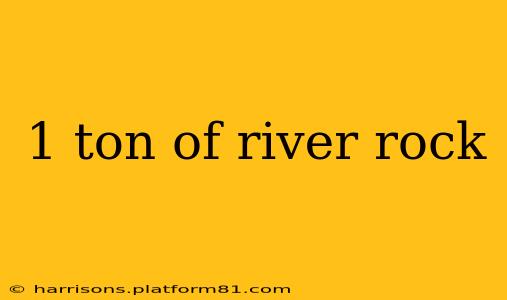River rock, with its smooth, naturally tumbled surfaces and diverse color palettes, is a popular choice for landscaping, hardscaping, and decorative projects. But what exactly does one ton of river rock entail? This guide dives deep into understanding the volume, uses, and considerations when working with a ton of this versatile material.
How Much Space Does 1 Ton of River Rock Cover?
This is a frequently asked question, and the answer isn't straightforward. The volume a ton of river rock occupies depends heavily on the size of the individual rocks. Smaller river rocks will pack more densely, covering a larger area per ton than larger, coarser rocks.
-
Smaller River Rock (1-2 inch): A ton of smaller river rock might cover an area of approximately 80-100 square feet, spread to a depth of 2 inches.
-
Larger River Rock (3-4 inch): A ton of larger river rock will cover a considerably smaller area, perhaps 40-60 square feet at a 2-inch depth.
These are estimates. For precise calculations, consult with your supplier or use an online gravel calculator that takes the rock size into account. Remember to factor in the desired depth of your river rock application. A thicker layer will, naturally, cover a smaller area.
What Can You Do with 1 Ton of River Rock?
One ton of river rock offers a surprising amount of versatility for various projects, both large and small. Here are some common uses:
- Landscaping: Creating pathways, borders, or accent areas in your garden. The natural beauty of river rock complements many plant species and garden styles.
- Hardscaping: Building dry creek beds, constructing retaining walls (in conjunction with other materials), or creating a decorative rock garden.
- Decorative Applications: Filling decorative planters, creating a focal point around a water feature, or enhancing the aesthetic appeal of patios and walkways.
- Drainage Solutions: Improving drainage in problem areas, especially when combined with other landscaping solutions.
How Much Does 1 Ton of River Rock Cost?
The price of river rock varies significantly depending on location, supplier, rock size, and the type of river rock (some have more desirable colors or textures than others). Costs typically range from $30 to $80 per ton. It's always best to contact multiple local suppliers for the most accurate and competitive pricing in your area.
What are the Different Sizes of River Rock?
River rock comes in a wide range of sizes, typically categorized by their diameter. Common sizes include 1-2 inches, 2-3 inches, and 3-4 inches. Larger sizes are also available but are less common for typical landscaping projects. Choosing the right size depends entirely on the intended use and the aesthetic desired.
Is River Rock Suitable for Driveways?
While river rock is aesthetically pleasing, it's generally not recommended for driveways. The uneven surface can be difficult for vehicles to navigate, and the rocks can shift and create ruts over time. Materials like gravel or paving stones are far better suited for driveways.
How to Calculate How Much River Rock You Need?
Accurately calculating your river rock needs involves measuring the area you want to cover and the desired depth. Then, you need to consider the bulk density of the river rock (the weight per cubic foot), which varies depending on the size of the rock. Using an online calculator can simplify this process significantly. Remember that you'll likely want to buy a little extra to account for settling and any unforeseen circumstances.
This guide provides a comprehensive overview of working with one ton of river rock. Remember to always consult with your local supplier for specific details regarding pricing, availability, and the volume covered by a ton of their particular river rock. With careful planning and the right amount of river rock, you can create a stunning and functional landscape for your home or project.
